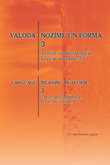Prefiksālie atvasinājumi ar negāciju ne-
Prefixed derivatives with the negation ne-
Author(s): Anna FrīdenbergaSubject(s): Language and Literature Studies, Theoretical Linguistics, Morphology, Lexis, Baltic Languages
Published by: Latvijas Universitātes Akadēmiskais apgāds
Keywords: nominālā vārddarināšana; atvasināšana; prefiksācija; negācija ne-; demotivācija; leksikalizēšanās;
Summary/Abstract: Derivation with the negation ne- is a very productive word formation pattern in Latvian and also comparatively simple, as it usually expresses predictable meaning – negative or reversative, and doesn’t depend on category of the base. These derivatives are related both with grammaticalization and lexicalization. They are the result of grammaticalization as a particle has become an affix. Derivatives have a tendency to lexicalize, too. In Latvian negative prefix ne- is widely used in the formation of verbs and adjectives, as well as nouns. The meaning of some old nominal formatives with ne- is not derivable from the present meanings existing in the language or predictable from the constituents of the word. The original motivation of word formation is not recognizable. Different loanwords already with ne- also support lexicalization. Sometimes the base word has gained its present meaning from the prefixed derivative. Negation ne- can also indicate reinforcement of the meaning. The meanings of negated derivatives have changed in the course of time. In many cases figurative meaning in old nominal negated derivatives dominates. The order of affixation sometimes is hard to determine, but suffixed derivatives with ne- are often coined from the base already containing this prefix – for example, abstract nouns are formed from the negated verb by the means of suffixation and not by means of prefixation adding negation to the base.
Journal: Valoda: nozīme un forma
- Issue Year: 2013
- Issue No: 3
- Page Range: 28-37
- Page Count: 10
- Language: Latvian

